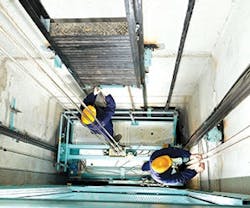How long is your vertical transportation technician’s workday? How late can you place a service call and still get the problem addressed the same day?
These issues and more belong in the contract you sign with your service provider, but often, they’re not included. Make sure your contract covers considerations like these – leaving them out could have a significant impact on the cost and pacing of your vertical transportation project.
How Contract Language Is Negotiated
Contract negotiation can benefit from the assistance of someone with a long history of experience with vertical transportation, says Martha Hulgan, a 30-plus-year veteran of the elevator industry and president of MMH & Associates Elevator Consulting.
Additionally, someone whose specialty aligns closely with the type of project you’re planning can help you write a more informed contract for services that extend beyond standard maintenance or bidding. For example, if your project requires a high degree of technical detail, such as an escalator installation, consider going over the details with an escalator specialist who has years of experience in installation, maintenance, or engineering.
“Your contract should also define what a workday is, which helps coordinate the timeframe for the contract,” Hulgan explains. “For example, in most of the healthcare buildings I’ve worked in, we make the regular time for an elevator technician from 7 a.m. to 6 p.m. If the building owner calls before 3:30 p.m., the call has to be answered the same day. If the contractor leaves an elevator down for X number of days, then the customer can pro-rate it out of their maintenance budget and get a credit. There are a lot of things I put in the scope of work for elevator owners that you would not normally see.”
Negotiating these contracts instead of simply signing a boilerplate version from the service provider ensures that there’s zero ambiguity from day one, preventing potential future surprises.
“There can be hidden language in the elevator companies’ contracts that binds you to a non-cancellable contract,” Hulgan warns. “They may not give you information as to what you can expect as far as the performance of the elevator is concerned. If you write your own contract, it makes life so much easier and the elevator company is made more accountable.”
Consider bringing a consultant on board if any stage of your project could benefit from an extra set of eyes, whether you want a temporary project manager to keep the techs on pace or just need to make sure you’re being billed correctly.
What Consultants Do
Because consultants work for you, not for a manufacturer or outside contractor, they’re not biased toward a particular provider, Hulgan says. This helps ensure that you’re not stuck buying proprietary equipment or parts, and service contracts are fair to all parties and properly enforced.
“If a certain project is needed for an elevator and it’s billable above and beyond the maintenance contract, a building owner will send it to me to make sure it’s not covered in the maintenance agreement,” explains Hulgan. “Sometimes the people in the field haven’t read the contract, so they may not know what is and isn’t covered because there are a lot of nuances involved in that process.”
Service offerings may include audits – a type of site visit where the consultant inspects your equipment against its maintenance history and contract to make sure work has been completed correctly – as well as bid management, contract negotiation, project management and monitoring, or other specialties.
Ultimately, the consultant should end up with an agreement between you and the contractor that’s tailored to your building’s unique needs, says Gordon Ernst, president of Elevator Consulting Services and executive director of the International Association of Elevator Consultants (IAEC). The scope of work should spell out expectations down to the smallest detail.
“We don’t say ‘as required’ or ‘as needed’ in specifications. It’s either required or it’s not,” Ernst explains. “There’s no gray area – when contractors bid the project, they know exactly what they have to provide.”
Find the Best Consultant for You
Like any outside professional, your consultant should boast a sufficient amount of time in the elevator industry, experience on projects like yours, and any required certifications or education. The ideal consultant proves they’re trustworthy and builds a relationship with you and your company, Hulgan says.
“Ask about the consultant’s background,” Ernst adds. “Can he actually install elevators? Did he service them, and did he have a service route? Was he in sales or management? You want to feel comfortable with them and be assured that they know what they’re talking about.”
Ask colleagues about their recent vertical transportation projects, Hulgan advises. The consultant database at iaec.org can also help narrow down your choices.
“A good consultant will save the owner money,” Hulgan says. “That doesn’t mean they would recommend that the owner always go with the low price, because the consultant should be performance-driven, not price-driven. Throughout the process of helping customers know whether they’re paying for something that should be covered, they can save a tremendous amount of money.”
Janelle Penny [email protected] is associate editor of BUILDINGS.
About the Author
Janelle Penny
Editor-in-Chief at BUILDINGS
Janelle Penny has been with BUILDINGS since 2010. She is a two-time FOLIO: Eddie award winner who aims to deliver practical, actionable content for building owners and facilities professionals.

